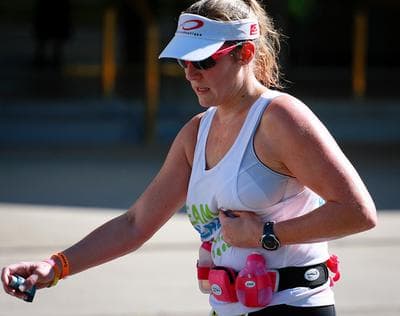Advertisement
Why To Exercise Today: It's As Good As (Or Better Than) Drugs
In my house, there's a little sticker over the sink that says: "Exercise before showering!"
We don't always abide by that, but we always aspire to it.
And here's yet another rational analysis to back us up: new research published in the BMJ concludes that physical activity looks to be as effective as many drugs for patients with existing heart disease or stroke.
Exercise, say the study authors, “should be considered as a viable alternative to, or alongside, drug therapy.”
From the paper:
Although limited in quantity, existing randomised trial evidence on exercise interventions suggests that exercise and many drug interventions are often potentially similar in terms of their mortality benefits in the secondary prevention of coronary heart disease, rehabilitation after stroke, treatment of heart failure, and prevention of diabetes.

Here's more from the BMJ news release:
Physical activity has well documented health benefits, yet in the UK, only 14% of adults exercise regularly, with roughly one third of adults in England meeting recommended levels of physical activity. In contrast, prescription drug rates continue to skyrocket, sharply rising to an average of 17.7 prescriptions for every person in England in 2010, compared with 11.2 in 2000.
But there is very little evidence on how exercise compares with drugs in reducing the risk of death for common diseases.
So researchers based at the London School of Economics, Harvard Pilgrim Health Care Institute at Harvard Medical School and Stanford University School of Medicine set out to compare the effectiveness of exercise versus drugs on mortality across four conditions (secondary prevention of coronary heart disease, rehabilitation of stroke, treatment of heart failure and prevention of diabetes).
Secondary prevention refers to treating patients with existing disease before it causes significant illness.
They analysed the results of 305 randomised controlled trials involving 339,274 individuals and found no statistically detectable differences between exercise and drug interventions for secondary prevention of heart disease
and prevention of diabetes.
Among stroke patients, exercise was more effective than drug treatment, while for heart failure, diuretic drugs were more effective than exercise and all other types of drug treatment.
The authors point out that the amount of trial evidence on the mortality benefits of exercise is considerably smaller than that on drugs, and this may have had an impact on their results.
They argue that this “blind spot” in available scientific evidence “prevents prescribers and their patients from understanding the clinical circumstances where drugs might provide only modest improvement but exercise could yield more profound or sustainable gains in health.”
Despite this uncertainty, they say that, based on the available data, physical activity is potentially as effective as many drug interventions – and call for more trials to address the disparity between exercise and drug-based treatment evidence.
“In cases where drug options provide only modest benefit, patients deserve to understand the relative impact that physical activity might have on their condition,” they conclude.
Take a look at the
Physical activity is potentially as effective as many drug interventions for patients with existing coronary heart disease and stroke, suggests a review of evidence published on bmj.com today.
The researchers argue that more trials comparing the effectiveness of exercise and drugs are urgently needed to help doctors and patients make the best treatment decisions. In the meantime, they say exercise “should be considered as a viable alternative to, or alongside, drug therapy.”
Physical activity has well documented health benefits, yet in the UK, only 14% of adults exercise regularly, with roughly one third of adults in England meeting recommended levels of physical activity. In contrast, prescription drug rates continue to skyrocket, sharply rising to an average of 17.7 prescriptions for every person in England in 2010, compared with 11.2 in 2000.
But there is very little evidence on how exercise compares with drugs in reducing the risk of death for common diseases.
So researchers based at the London School of Economics, Harvard Pilgrim Health Care Institute at Harvard Medical School and Stanford University School of Medicine set out to compare the effectiveness of exercise versus drugs on mortality across four conditions (secondary prevention of coronary heart disease, rehabilitation of stroke, treatment of heart failure and prevention of diabetes).
Secondary prevention refers to treating patients with existing disease before it causes significant illness.
They analysed the results of 305 randomised controlled trials involving 339,274 individuals and found no statistically detectable differences between exercise and drug interventions for secondary prevention of heart disease and prevention of diabetes.
Among stroke patients, exercise was more effective than drug treatment, while for heart failure, diuretic drugs were more effective than exercise and all other types of drug treatment.
The authors point out that the amount of trial evidence on the mortality benefits of exercise is considerably smaller than that on drugs, and this may have had an impact on their results.
They argue that this “blind spot” in available scientific evidence “prevents prescribers and their patients from understanding the clinical circumstances where drugs might provide only modest improvement but exercise could yield more profound or sustainable gains in health.”
Despite this uncertainty, they say that, based on the available data, physical activity is potentially as effective as many drug interventions – and call for more trials to address the disparity between exercise and drug-based treatment evidence.
“In cases where drug options provide only modest benefit, patients deserve to understand the relative impact that physical activity might have on their condition,” they conclude.
Contact:
Huseyin Naci, Researcher, LSE Health, London School of Economics & Political Science, London, UK
Please note author is currently in the US – please email in the first instance: h.naci@lse.ac.uk
Embargoed link to full study: http://press.psprings.co.uk/bmj/october/exercise.pdf
Public link once embargo lifts: http://www.bmj.com/cgi/doi/10.1136/bmj.f5577
This program aired on October 2, 2013. The audio for this program is not available.
